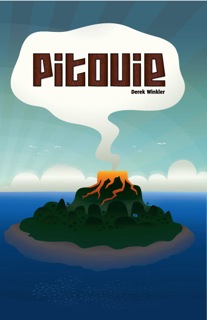Derek Winkler's Pitouie: How to Use the Environment for Selfish Reasons

Writing fiction based on yourself can be dangerous—it's not difficult to turn thoughtful introspection into full-blown navel-gazing. In Pitouie, Derek Winkler's first novel, the main character—like the author—is a journalist for an obscure trade publication. Fortunately, Winkler keeps the narcissism in check. "In a way [protagonist Otis Wilson] is cooler and more capable than me and in ways he's also much more pathetic and much more a loser than me," said the author. "He's me, better and worse than I actually am."
I spoke to the author via voice chat from Toronto for his "blog tour": he is being featured on a series of websites, including Maisonneuve's, to promote Pitouie, published by the new Canadian press the Workhorsery. Wilson, like Winkler, does most of his work rewording press releases from companies that buy ad space in his magazine, Waste Insight. He covers—or, as Winkler puts it, "lightly coats"—all of the exciting developments in the waste disposal industry.
But when Wilson gets an invitation to cover the sale of the South Pacific island Pitouie to multinationals for use as a toxic waste dump, he sees an opportunity. It is a chance for him to ditch his soul-numbing job and write a hard-hitting investigative report on environmental exploitation. However, being the schmo that he is, he initially turns the chance down. Only when his girlfriend dumps him for their pothead neighbour does he head to the tropical island and find out the diabolical harm being done to the people of Pitouie.
Wilson's story parallels another seemingly disparate narrative that takes place during the 1970s in the Canadian arctic. Lars Varick, like Wilson, is stuck in a boring job: he works in a Distant Early Warning Line Station, watching a radar screen for eight hours a day, making sure that no Russian bombers are approaching. They never do. As opposed to Wilson, he has no qualms with the monotony. Where Wilson is afraid to ditch the security of his job for idealistic pursuits, Varick fears losing his mind-numbing routine.
Then Varick discovers what appears to be a plot to sell off Inuit land to mining companies. Out of a desire to maintain his lifestyle—getting stoned and listening to the same ten records over and over in arctic isolation—he attempts to expose the conspiracy. He then gets pulled into a scheme being perpetrated by the station's captain and faces the consequences of doing business with a con man. Winkler skillfully paces the two stories, alternating each chapter between the two, before they meet two-thirds of the way into the book.
The book deals with using the environment for selfish reasons: Wilson uses the environment to boost his career and self-esteem, Varick needs it to maintain his routine and multinationals need it to dump their trash somewhere. But Winkler is not as glib as that. He balances environmentalist messages with strong plot development and sharp dialogue All of the characters are witty and quirky—occasionally too much so. Still, the world that Winkler has created works well with the oddness of the people he has populated it with. The book almost reads like a well-constructed sitcom, with even a sappy love story thrown into the mix.
"I didn't want it to be a massively environmental novel," said Winkler, adding that the environmentalist tone was more of a "plot device" rather than any kind of attempt at activism. More than anything, he said, he wanted to write a readable Canadian novel, which is partially why he approached the Workhorsery with the manuscript. Another author told Winkler Pitouie was not a book most Canadian publishers would be interested in. The Workhorsery, on the other hand, is attempting to make a name for itself publishing "non-traumatizing Canadian fiction." The author identified with the press' vision; he does not think the novel is traditional Canadiana, but still a "Canadian book with Canadian people in it, doing very Canadian things."
Whether or not the labels are apt, Winkler has written a funny and lighthearted book. It may not garner any sober discussions on CBC radio about multiculturalism or climate change, but it will entertain those who read it.
Related on maisonneuve.org:
—Why the Giller Uproar Isn't Gaspereau's Fault
—Why I Don't Care What Sarah Palin is Reading
—Interview With a Guy Who Tests Tape
Subscribe — Follow Maisy on Twitter — Like Maisy on Facebook





